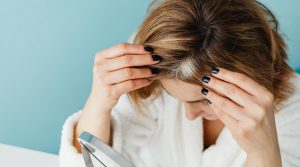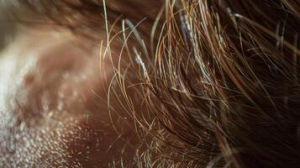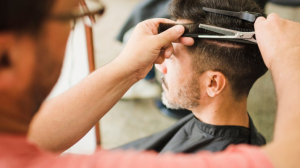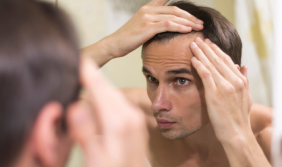Are Steroid Shots for Hair Loss Effective?
Steroid injections can address various health issues, including some types of hair loss.
There are two main categories of steroids: anabolic steroids and corticosteroids. Both are used to treat a range of diseases and conditions, but they have different effects on hair loss.
Anabolic steroids, which primarily manage androgen hormone levels, can lead to or exacerbate conditions like male and female pattern baldness (androgenetic alopecia). In contrast, corticosteroid injections can be effective for treating certain types of hair loss, though they do not address hair loss caused by anabolic steroids.
Below, we’ll explore how corticosteroids might help with specific hair loss conditions, their potential side effects, and alternative treatment options you might consider.
What Are Steroid Shots for Hair Loss?
Steroid injections, specifically corticosteroids, are often used to treat various forms of hair loss caused by autoimmune conditions such as alopecia areata, where the immune system mistakenly attacks healthy hair follicles. This can result in patchy hair loss on the scalp and, in more severe cases, affect body hair as well. Steroid shots can also help manage hair loss due to other autoimmune diseases like psoriasis, discoid lupus, and lichen planopilaris by reducing inflammation and suppressing the immune response.
Corticosteroids are powerful medications used to treat a wide range of health conditions beyond hair loss. They are commonly prescribed for hepatitis, inflammatory bowel disease (IBD), irritable bowel syndrome (IBS), leukemia, lymphoma, arthritis, adrenal disorders, dermatitis, and asthma. They are also used to prevent organ rejection in transplant recipients. In the context of hair loss, these injections can help protect your hair follicles from the immune system’s attacks, potentially promoting hair regrowth in affected areas.
Are Steroid Injections Effective for Hair Loss?
The effectiveness of corticosteroid injections depends largely on the type of hair loss you’re experiencing. They are particularly effective for conditions like alopecia areata, where they are administered directly into the affected areas of the scalp to reduce inflammation. For more extensive forms of alopecia areata, which can lead to complete hair loss on the scalp or body (alopecia totalis), these injections may be used to control the immune response and promote hair regrowth.
However, steroid injections are not a universal solution for all types of hair loss. They are not typically effective for genetic or hormonal hair loss conditions, such as male pattern baldness (androgenetic alopecia) or telogen effluvium, which is often triggered by stress or shock to the body. These types of hair loss usually require different treatment approaches.
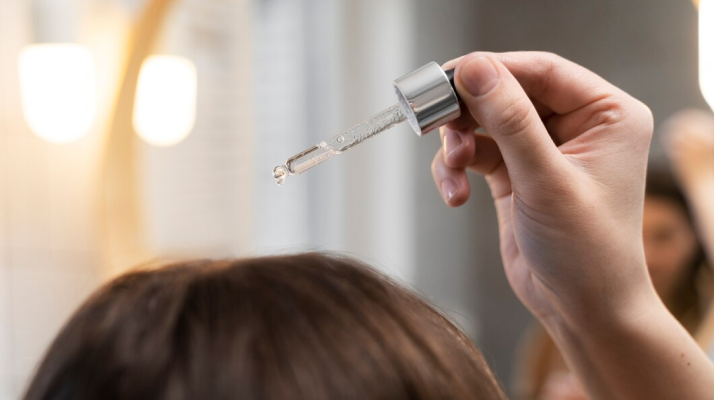
How Do Steroid Injections Work for Hair Loss?
Steroid injections work by suppressing the immune system and reducing inflammation around the hair follicles. In the case of alopecia areata, the immune system mistakenly targets the hair follicles, treating them as foreign invaders. By reducing this inflammatory response, steroid injections can help prevent further hair loss and, in some cases, stimulate hair regrowth.
The National Library of Medicine (NLM) notes that corticosteroids can have off-label benefits, including increased hair growth or regrowth. For alopecia areata, a dermatologist may also recommend using topical steroids to complement the injections and enhance their effectiveness.
Steroid Injections for Other Types of Hair Loss
While corticosteroid injections are effective for autoimmune-related hair loss, they are not recommended for treating male pattern baldness or telogen effluvium. These conditions are typically treated with other medications, such as minoxidil and finasteride. Minoxidil, a topical solution, works by increasing blood flow to the hair follicles, while finasteride, an oral medication, reduces levels of DHT—a hormone linked to male pattern baldness.
Side Effects of Steroid Injections for Hair Loss
Although steroid injections can be beneficial, they come with potential side effects, especially if used frequently or in high doses. Common side effects include:
- Skin Hypopigmentation and Atrophy: This refers to lightening and thinning of the skin around the injection site.
- Post-Injection Flare: Temporary pain or swelling at the injection site.
- Infection: There is a risk of infection, although this is rare with proper administration.
- Osteoarthritis and Tendon Rupture: Higher systemic absorption of steroids can lead to bone and joint issues.
- Systemic Effects: These include reduced bone density (osteoporosis), adrenal suppression, and increased risk of conditions like diabetes, myopathy, cataracts, glaucoma, psychiatric disturbances, and weakened immune function.
There are also rare instances where corticosteroid use can paradoxically affect hair health, leading to thinning of the scalp. Because of these potential risks, corticosteroids are usually not the first line of treatment for most types of hair loss.
Alternatives to Steroid Treatments for Hair Loss
Given the complexities of hair loss, a healthcare provider will first determine the underlying cause of your condition. For many people, other FDA-approved treatments may be more suitable:
- Minoxidil: An FDA-approved topical treatment that stimulates hair growth by increasing blood flow to the hair follicles. It’s effective for both male and female pattern baldness and can be used to treat various types of hair loss disorders.
- Finasteride: An oral medication that reduces levels of DHT, a hormone responsible for shrinking hair follicles in male pattern baldness. Lowering DHT levels can help prevent further hair loss and, in some cases, promote hair regrowth.
- Hair Vitamins: Deficiencies in vitamins like A, D, and biotin can contribute to hair loss. Supplements can help, but it’s best to consult with a healthcare provider to identify any deficiencies before starting supplementation.
Are Steroid Injections Right for You?
Deciding whether steroid injections are the right treatment for your hair loss depends on several factors, including the type of hair loss and its severity. If you’re experiencing patchy hair loss due to alopecia areata or another autoimmune condition, steroid injections may be beneficial. However, for other types of hair loss, such as male pattern baldness, alternative treatments like minoxidil and finasteride are generally more effective.
It’s essential to have a conversation with a healthcare professional who can assess your hair loss, review your medical history, and recommend a treatment plan tailored to your needs. For more information on hair loss, thinning hair, and various treatment options, consult our comprehensive hair health guides or schedule an online consultation with a healthcare provider to explore the best course of action for your situation.
